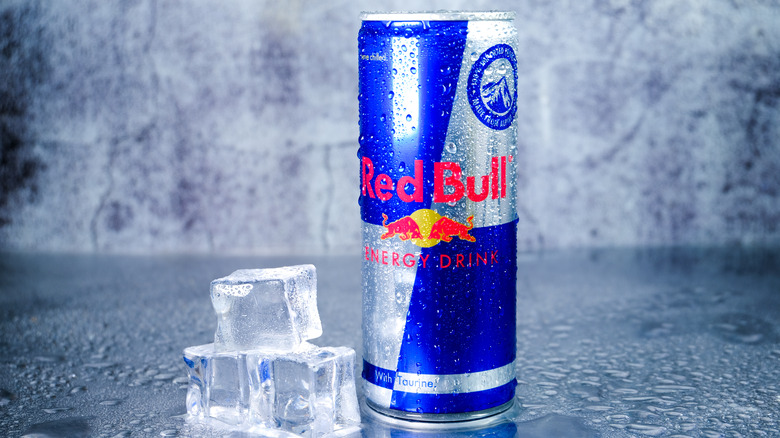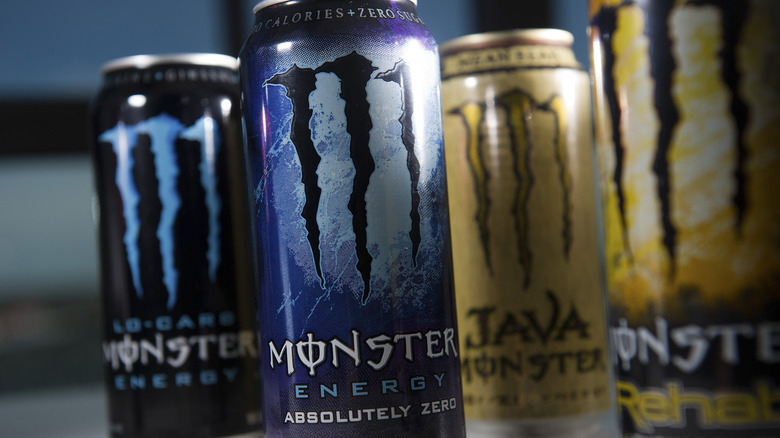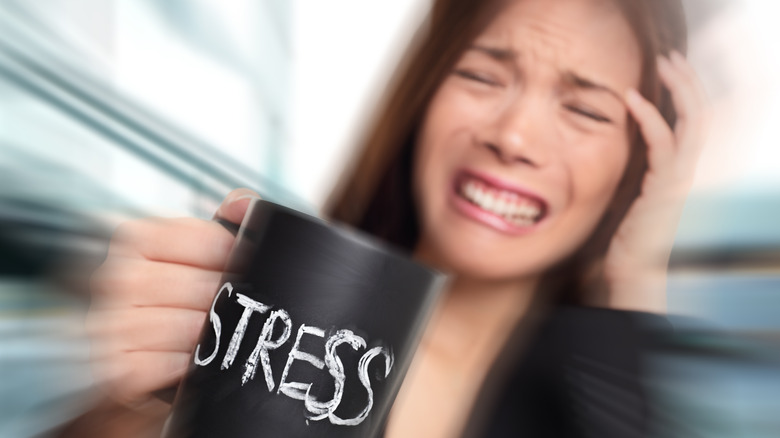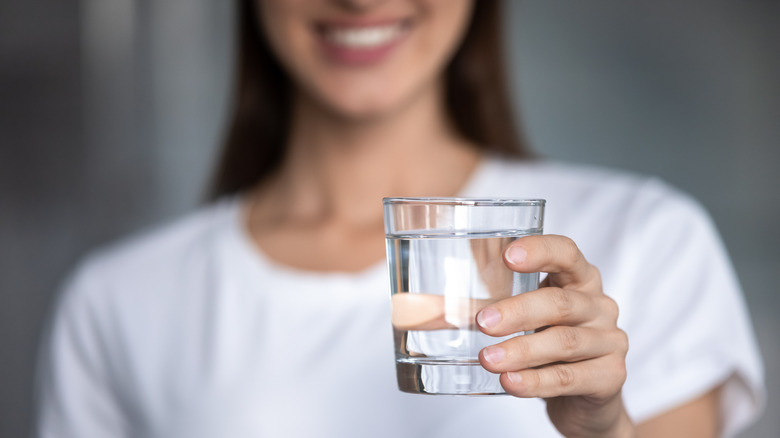When You Have Energy Drinks Every Day, This Happens
While Coke and Pepsi – and coffee, of course – contain plenty of caffeine, they haven't ever been really marketed specifically for their energizing properties. So where, then, did all those energy drinks that take up half the shelf space in any given gas station actually come from? While The New York Times Magazine reports that there's a 72-year-old vitamin-enhanced caffeinated drink called Dr. Enuf that's still on the market (at least, if you shop in the greater Chicago area, per the Dr. Enuf website), the modern energy drink as we know it, is a product of midcentury Japan, also the birthplace of kaiju. While the Japanese lost no time exporting Godzilla and the gang to the U.S, it took another few decades for "go juice" to catch on here. Energy drinks really started to take off in the late 90s, though, when Red Bull gave them wings.
While energy drink addicts may feel as if they're making a healthy beverage choice, Brenda Braslow, a Registered Dietitian who works for the nutrition app MyNetDiary, says she's "not a fan of energy drinks." In a conversation with Mashed, she laid out some of her concerns with these popular beverages.
What makes something an energy drink?
Energy drinks, Braslow says, are "pre-packaged drinks that are promoted to increase mental alertness, boost energy levels, and enhance physical performance." The key word here is "promoted" – as she mentions, the active ingredient in these drinks is caffeine and they also provide lots of sugar, both of which you can get from sodas and sweetened coffee drinks. She does say, though, that energy drinks and "energy shots" (concentrated beverages in smaller containers) tend to contain extremely high levels of caffeine, anywhere from double to 10 times what you'd get from the average soda and double or triple the caffeine levels of a cup of coffee.
Braslow also speaks of those "other 'energy-boosting' ingredients such as glucose, B vitamins, ginseng, and taurine" found in energy drinks. "Some energy drinks," she tells Mashed, "are marketed to enhance your exercise workout by providing a high caffeine content, creatine, and branched-chain amino acids." Well, that sounds pretty darn healthy, all right. No wonder those things are flying off the shelf! Not so fast ... Braslow points out that since energy drinks are marketed as either "beverages or dietary supplements," this means they are not required by law to disclose caffeine content and also have little regulatory insight over everything else they contain or the benefits they claim to provide. What this means for the consumer, she says, is that "you are on your own as far as safety of the excessive caffeine content and safety of the other ingredients."
Energy drinks can take a toll on your health
So what safety issues can energy drinks pose? For one thing, Braslow warns that "other ingredients could potentially amplify the caffeine's stimulant effect," ingredients such as guarana, which has its own natural caffeine. She also notes that "combining energy drinks with alcohol is extremely dangerous" due to the fact that the stimulant effects of these drinks may make a person feel as if they're less intoxicated, while their reaction time and motor coordination (and decision-making ability) are just as impaired as they would have been had Jäger been consumed without the bomb.
The caffeine content of energy drinks alone is cause for concern. The more caffeine you consume, the more you become accustomed to it, and soon, says Braslow, you'll be "reliant on higher and higher levels to get the desired stimulant effect," resulting in "an unhealthy excessive caffeine intake with potential health side effects." The side effects she listed for us, including a fast, erratic heart rate, spiking blood pressure, anxiety, irritability, sleep disturbances, abdominal spasms, diarrhea, nausea, vomiting, and constant trips to the bathroom (and resulting dehydration) sound like a whole lot of no fun. According to one study Braslow cited, the number of emergency room visits due to energy drink consumption more than doubled over a four-year span from 2007 to 2011 from around 10,000 to over 20,000. And according to U.S. News and World Report, there have been deaths due to over-consumption of energy drinks.
The best alternative to energy drinks
So what should you do for a boost if energy drinks are too dangerous to consume every day? Braslow doesn't suggest switching back to coffee or even tea. Instead, she says, "If you find yourself really short on energy to the point where you need to resort to excessive caffeine, take a look at your lifestyle and consider making some changes." Perhaps you need to get more, or better-quality, sleep at night, or maybe you need to schedule in a few breaks during the day. If you are suffering from stress or anxiety, these could be draining your energy away. Maybe you need to be eating a healthier diet, or maybe you're just dehydrated and in need of just plain water without all the additives. Maybe you even have a medical condition such as anemia. Braslow advises you to "consider seeing your doctor to rule out medical reasons for low energy."
Still got a Monster on your back (or in your hand)? Here are a few more points to ponder. For one thing, if you give up energy drinks you'll likely be cutting out a LOT of calories. (Braslow says some drinks contain nearly half a cup of added sugar!) For another, Braslow brings up the economic argument: "It could save you a lot of money if you aren't buying expensive energy drinks." Fewer calories, more money, and less risk of seriously unpleasant side effects ... Just saying no to energy drinks sounds like a plan.



